
Cet article vous présentera comment installer PHP7.0 dans un environnement Linux. Il a une certaine valeur de référence. Les amis dans le besoin peuvent s'y référer. J'espère qu'il sera utile à tout le monde.

Comparaison entre PHP7 et HHVM
Les performances de PHP7 dans des scénarios réels sont en effet équivalentes à HHVM, et dépassent même HHVM dans certains scénarios. Le fonctionnement et la maintenance de HHVM sont complexes et il s'agit d'un modèle multithread. Cela signifie que si un thread provoque un crash, l'ensemble du service se bloquera et ne redémarrera pas automatiquement. De plus, il utilise JIT, ce qui signifie qu'il doit être réchauffé après le redémarrage. Sans préchauffage, les performances seront pires. De plus, le modèle multithread est difficile à déboguer, ce qui est très inadapté aux services Web qui recherchent la stabilité.
Pour les versions antérieures à Nginx et PHP7.0, merci de vous référer à cet article : Installation et débogage de Nginx et installation de PHP dans un environnement Linux
La version officielle de PHP7.0 est sortie vers novembre 2015, il s'agit actuellement de la version PHP7.0.2. J'ai commencé avec la première version bêta de php7 en août 2015, et maintenant la version officielle est publiée.
Version Linux : CentOS 6.6 64 bits
Version Nginx : nginx1.8.0
Version php : php-7.0.2
Télécharger
# wget http://php.net/get/php-7.0.2.tar.gz/from/a/mirror
Il est recommandé de vérifier le fichier d'aide à l'installation avant l'installation INSTALL
Décompressez l'installation
# tar zxvf php-7.0.2.tar.gz # cd php-7.0.2
Vérifiez d'abord l'aide à l'installation
# ./configure --help # ./configure --prefix=/usr/local/php \ --with-curl \ --with-freetype-dir \ --with-gd \ --with-gettext \ --with-iconv-dir \ --with-kerberos \ --with-libdir=lib64 \ --with-libxml-dir \ --with-mysqli \ --with-openssl \ --with-pcre-regex \ --with-pdo-mysql \ --with-pdo-sqlite \ --with-pear \ --with-png-dir \ --with-xmlrpc \ --with-xsl \ --with-zlib \ --enable-fpm \ --enable-bcmath \ --enable-libxml \ --enable-inline-optimization \ --enable-gd-native-ttf \ --enable-mbregex \ --enable-mbstring \ --enable-opcache \ --enable-pcntl \ --enable-shmop \ --enable-soap \ --enable-sockets \ --enable-sysvsem \ --enable-xml \ --enable-zip
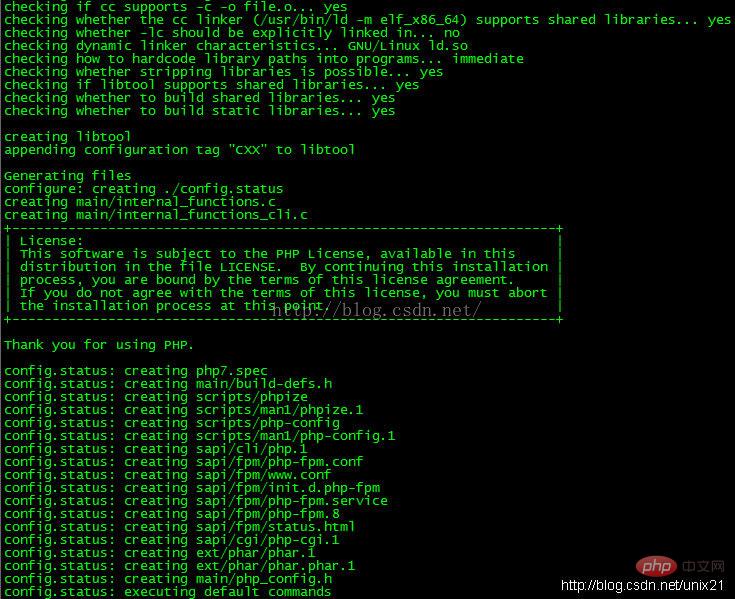
Si une erreur est configurée, vous devez installer les modules requis, directement miam pour installer les bibliothèques dépendantes ensemble
# yum -y install libjpeg libjpeg-devel libpng libpng-devel freetype freetype-devel libxml2 libxml2-devel mysql pcre-devel
Remarque : Il existe plusieurs configurations qui ne peuvent pas être résolues lors de l'installation de php7beta3. Vous devez yum. ce n'est plus le cas avec php-7.0.2.
# yum -y install curl-devel # yum -y install libxslt-devel
Compiler et installer
# make && make install
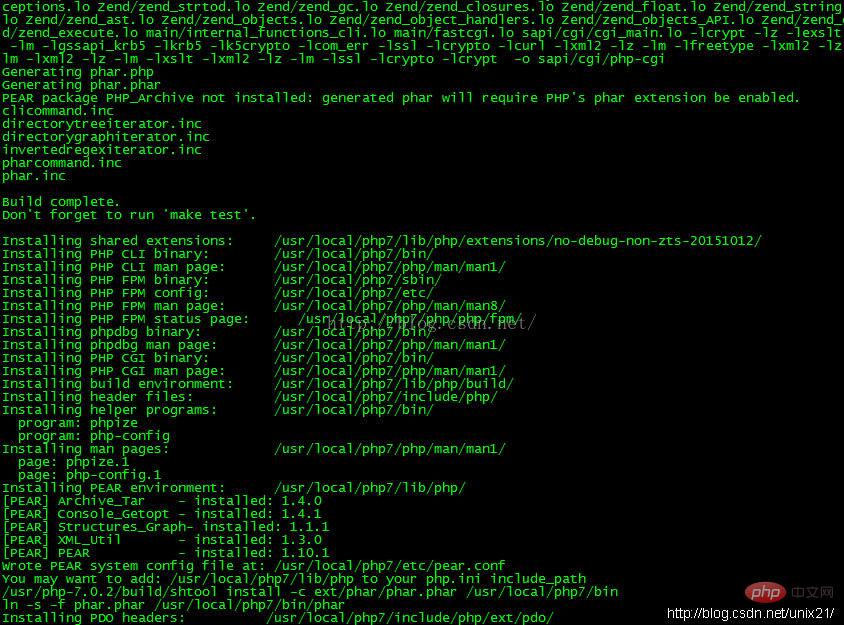
Fichier de configuration
# cp php.ini-development /usr/local/php/lib/php.ini # cp /usr/local/php/etc/php-fpm.conf.default /usr/local/php/etc/php-fpm.conf # cp /usr/local/php/etc/php-fpm.d/www.conf.default /usr/local/php/etc/php-fpm.d/www.conf # cp -R ./sapi/fpm/php-fpm /etc/init.d/php-fpm
Il est à noter que le fichier de configuration www.conf dans php7 est le numéro de port phpfpm configuré et d'autres informations, si vous modifiez le numéro de port 9000 par défaut, vous devez le modifier ici, puis modifier la configuration nginx
Démarrer
# /etc/init.d/php-fpm
Afficher phpinfo()
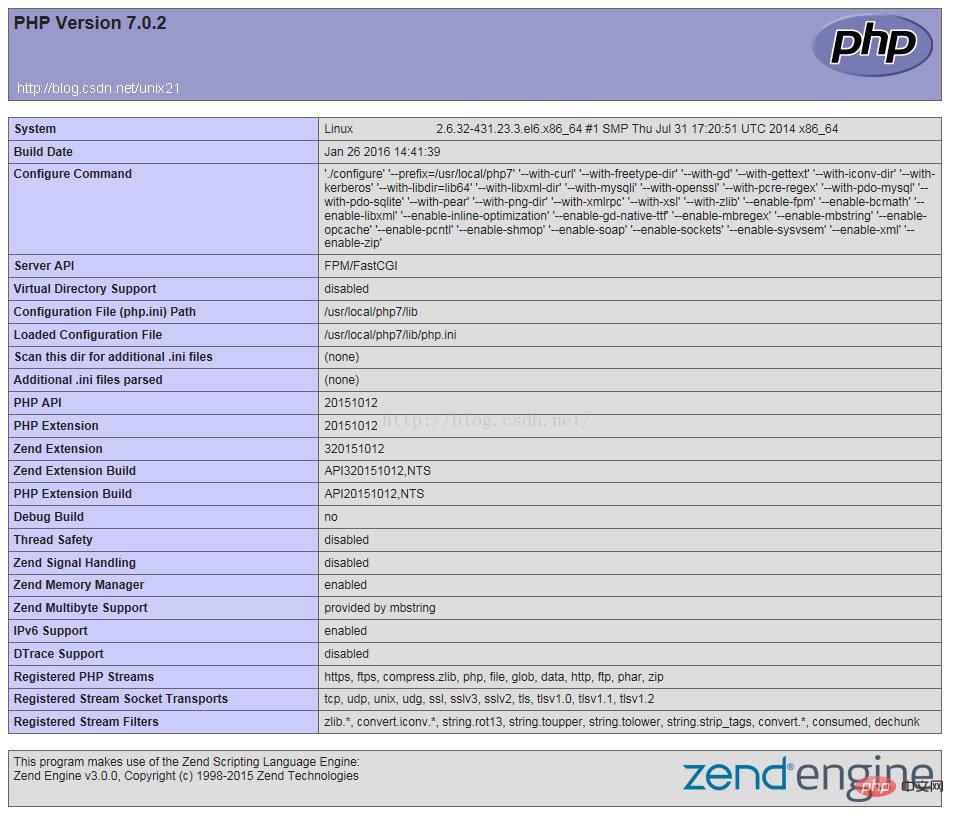
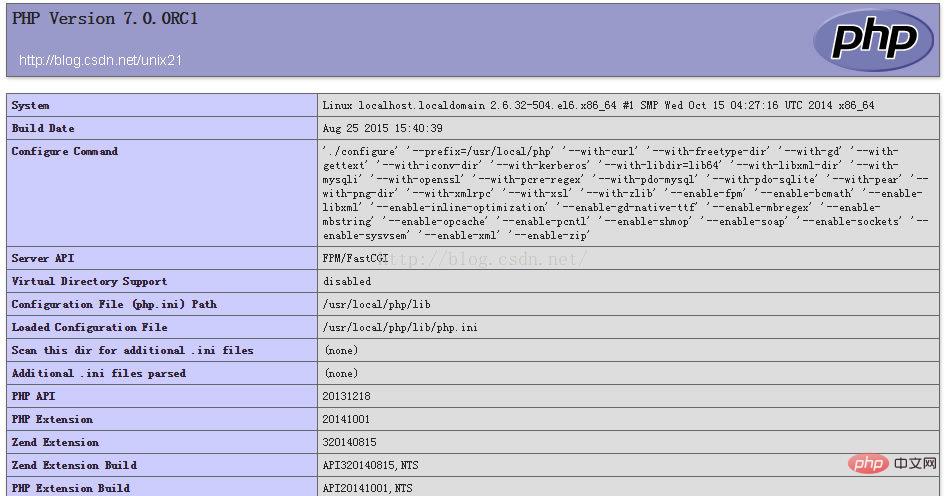
Analyse des performances et comparaison de php7 et php5
<?php
//time /usr/local/php5/bin/php search_by_key.php
$a = array();
for($i=0;$i<600000;$i++){
$a[$i] = $i;
}
foreach($a as $i)
{
array_key_exists($i, $a);
}
?>Générer un tableau de 600 000 éléments et déterminer si la clé existe en recherchant la clé.
PHP version 5.4.44
[root@localhost www5.4.44]# time /usr/local/php5.4.44/bin/php search_by_key.php
real 0m0 .351s
utilisateur 0m0.300s
sys 0m0.050s
PHP version 5.5.28
[root@localhost www]# time /usr/ local/php/bin/php search_by_key.php
réel 0m0.361s
utilisateur 0m0.304s
sys 0m0.057s
PHP 7.0.0 Version
[root@localhost www7]# heure /usr/local/php7/bin/php search_by_key.php
réel 0m0.114s
utilisateur 0m0.097s
sys 0m0.017s
Évidemment, les performances de php7 sont 3 fois supérieures à celles de php5 !
Configurer opcache
Adresse du site Web officiel : http://php.net/opcache
Utilisez les paramètres recommandés suivants pour obtenir de meilleures performances :
opcache.memory_consumption=128 opcache.interned_strings_buffer=8 opcache.max_accelerated_files=4000 opcache.revalidate_freq=60 opcache.fast_shutdown=1 opcache.enable_cli=1
Vous pouvez également désactiver opcache.save_comments et activer opcache.enable_file_override. Il convient de rappeler que la configuration ci-dessus doit être rigoureusement testée avant d'être utilisée dans un environnement de production. En raison d'un problème connu avec la configuration ci-dessus, cela entraînera des exceptions dans certains frameworks et applications, en particulier lorsque des documents utilisent des annotations de commentaires.
vim /usr/local/php7/etc/php.ini
# Rejoindre
Redémarrer
# killall php-fpm # /etc/init.d/php-fpm
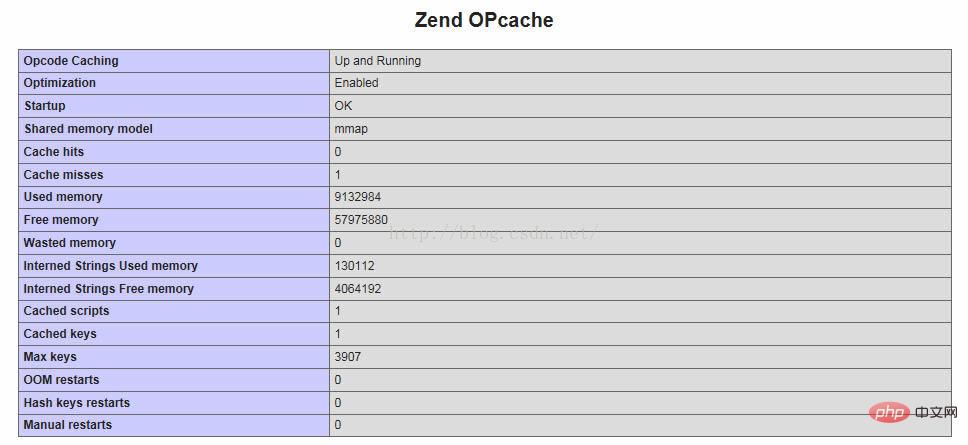
Si l'image ci-dessus n'est pas claire, vous pouvez utiliser le code de test d'état Opcache au niveau fin de l'article (https://gist.github.com/ck-on/4959032) pour démonstration :
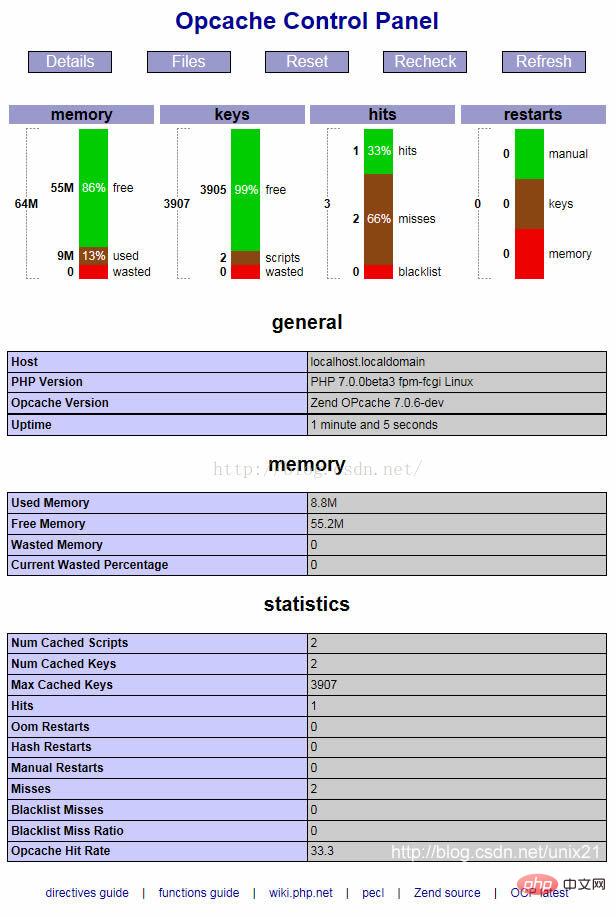
Code de test d'état Opcache (https ://gist.github.com /ck-on/4959032) pour démonstration :
<?php
/*
OCP - Opcache Control Panel (aka Zend Optimizer+ Control Panel for PHP)
Author: _ck_ (with contributions by GK, stasilok)
Version: 0.1.6
Free for any kind of use or modification, I am not responsible for anything, please share your improvements
* revision history
0.1.6 2013-04-12 moved meta to footer so graphs can be higher and reduce clutter
0.1.5 2013-04-12 added graphs to visualize cache state, please report any browser/style bugs
0.1.4 2013-04-09 added "recheck" to update files when using large revalidate_freq (or validate_timestamps=Off)
0.1.3 2013-03-30 show host and php version, can bookmark with hashtag ie. #statistics - needs new layout asap
0.1.2 2013-03-25 show optimization levels, number formatting, support for start_time in 7.0.2
0.1.1 2013-03-18 today Zend completely renamed Optimizer+ to OPcache, adjusted OCP to keep working
0.1.0 2013-03-17 added group/sort indicators, replaced "accelerator_" functions with "opcache_"
0.0.6 2013-03-16 transition support as Zend renames product and functions for PHP 5.5 (stasilok)
0.0.5 2013-03-10 added refresh button (GK)
0.0.4 2013-02-18 added file grouping and sorting (click on headers) - code needs cleanup but gets the job done
0.0.2 2013-02-14 first public release
* known problems/limitations:
Unlike APC, the Zend OPcache API
- cannot determine when a file was put into the cache
- cannot change settings on the fly
- cannot protect opcache functions by restricting execution to only specific scripts/paths
* todo:
Extract variables for prefered ordering and better layout instead of just dumping into tables
File list filter
*/
// ini_set('display_errors',1); error_reporting(-1);
if ( count(get_included_files())>1 || php_sapi_name()=='cli' || empty($_SERVER['REMOTE_ADDR']) ) { die; } // weak block against indirect access
$time=time();
define('CACHEPREFIX',function_exists('opcache_reset')?'opcache_':(function_exists('accelerator_reset')?'accelerator_':''));
if ( !empty($_GET['RESET']) ) {
if ( function_exists(CACHEPREFIX.'reset') ) { call_user_func(CACHEPREFIX.'reset'); }
header( 'Location: '.str_replace('?'.$_SERVER['QUERY_STRING'],'',$_SERVER['REQUEST_URI']) );
exit;
}
if ( !empty($_GET['RECHECK']) ) {
if ( function_exists(CACHEPREFIX.'invalidate') ) {
$recheck=trim($_GET['RECHECK']); $files=call_user_func(CACHEPREFIX.'get_status');
if (!empty($files['scripts'])) {
foreach ($files['scripts'] as $file=>$value) {
if ( $recheck==='1' || strpos($file,$recheck)===0 ) call_user_func(CACHEPREFIX.'invalidate',$file);
}
}
header( 'Location: '.str_replace('?'.$_SERVER['QUERY_STRING'],'',$_SERVER['REQUEST_URI']) );
} else { echo 'Sorry, this feature requires Zend Opcache newer than April 8th 2013'; }
exit;
}
?><!DOCTYPE html>
<html>
<head>
<title>OCP - Opcache Control Panel</title>
<meta name="ROBOTS" content="NOINDEX,NOFOLLOW,NOARCHIVE" />
<style type="text/css">
body {background-color: #fff; color: #000;}
body, td, th, h1, h2 {font-family: sans-serif;}
pre {margin: 0px; font-family: monospace;}
a:link,a:visited {color: #000099; text-decoration: none;}
a:hover {text-decoration: underline;}
table {border-collapse: collapse; width: 600px; }
.center {text-align: center;}
.center table { margin-left: auto; margin-right: auto; text-align: left;}
.center th { text-align: center !important; }
.middle {vertical-align:middle;}
td, th { border: 1px solid #000; font-size: 75%; vertical-align: baseline; padding: 3px; }
h1 {font-size: 150%;}
h2 {font-size: 125%;}
.p {text-align: left;}
.e {background-color: #ccccff; font-weight: bold; color: #000; width:50%; white-space:nowrap;}
.h {background-color: #9999cc; font-weight: bold; color: #000;}
.v {background-color: #cccccc; color: #000;}
.vr {background-color: #cccccc; text-align: right; color: #000; white-space: nowrap;}
.b {font-weight:bold;}
.white, .white a {color:#fff;}
img {float: right; border: 0px;}
hr {width: 600px; background-color: #cccccc; border: 0px; height: 1px; color: #000;}
.meta, .small {font-size: 75%; }
.meta {margin: 2em 0;}
.meta a, th a {padding: 10px; white-space:nowrap; }
.buttons {margin:0 0 1em;}
.buttons a {margin:0 15px; background-color: #9999cc; color:#fff; text-decoration:none; padding:1px; border:1px solid #000; display:inline-block; width:5em; text-align:center;}
#files td.v a {font-weight:bold; color:#9999cc; margin:0 10px 0 5px; text-decoration:none; font-size:120%;}
#files td.v a:hover {font-weight:bold; color:#ee0000;}
.graph {display:inline-block; width:145px; margin:1em 0 1em 1px; border:0; vertical-align:top;}
.graph table {width:100%; height:150px; border:0; padding:0; margin:5px 0 0 0; position:relative;}
.graph td {vertical-align:middle; border:0; padding:0 0 0 5px;}
.graph .bar {width:25px; text-align:right; padding:0 2px; color:#fff;}
.graph .total {width:34px; text-align:center; padding:0 5px 0 0;}
.graph .total p {border:1px dashed #888; border-right:0; height:99%; width:12px; position:absolute; bottom:0; left:17px; z-index:-1;}
.graph .total span {background:#fff; font-weight:bold;}
.graph .actual {text-align:right; font-weight:bold; padding:0 5px 0 0;}
.graph .red {background:#ee0000;}
.graph .green {background:#00cc00;}
.graph .brown {background:#8B4513;}
</style>
<!--[if lt IE 9]><script type="text/javascript" defer="defer">
window.οnlοad=function(){var i,t=document.getElementsByTagName('table');for(i=0;i<t.length;i++){if(t[i].parentNode.className=='graph')t[i].style.height=150-(t[i].clientHeight-150)+'px';}}
</script><![endif]-->
</head>
<body>
<p class="center">
<h1><a href="?">Opcache Control Panel</a></h1>
<p class="buttons">
<a href="?ALL=1">Details</a>
<a href="?FILES=1&GROUP=2&SORT=3">Files</a>
<a href="?RESET=1" οnclick="return confirm('RESET cache ?')">Reset</a>
<?php if ( function_exists(CACHEPREFIX.'invalidate') ) { ?>
<a href="?RECHECK=1" οnclick="return confirm('Recheck all files in the cache ?')">Recheck</a>
<?php } ?>
<a href="?" οnclick="window.location.reload(true); return false">Refresh</a>
</p>
<?php
if ( !function_exists(CACHEPREFIX.'get_status') ) { echo '<h2>Opcache not detected?</h2>'; die; }
if ( !empty($_GET['FILES']) ) { echo '<h2>files cached</h2>'; files_display(); echo '</p></body></html>'; exit; }
if ( !(isset($_REQUEST['GRAPHS']) && !$_REQUEST['GRAPHS']) && CACHEPREFIX=='opcache_') { graphs_display(); if ( !empty($_REQUEST['GRAPHS']) ) { exit; } }
ob_start(); phpinfo(8); $phpinfo = ob_get_contents(); ob_end_clean(); // some info is only available via phpinfo? sadly buffering capture has to be used
if ( !preg_match( '/module\_Zend (Optimizer\+|OPcache).+?(\<table[^>]*\>.+?\<\/table\>).+?(\<table[^>]*\>.+?\<\/table\>)/s', $phpinfo, $opcache) ) { } // todo
if ( function_exists(CACHEPREFIX.'get_configuration') ) { echo '<h2>general</h2>'; $configuration=call_user_func(CACHEPREFIX.'get_configuration'); }
$host=function_exists('gethostname')?@gethostname():@php_uname('n'); if (empty($host)) { $host=empty($_SERVER['SERVER_NAME'])?$_SERVER['HOST_NAME']:$_SERVER['SERVER_NAME']; }
$version=array('Host'=>$host);
$version['PHP Version']='PHP '.(defined('PHP_VERSION')?PHP_VERSION:'???').' '.(defined('PHP_SAPI')?PHP_SAPI:'').' '.(defined('PHP_OS')?' '.PHP_OS:'');
$version['Opcache Version']=empty($configuration['version']['version'])?'???':$configuration['version'][CACHEPREFIX.'product_name'].' '.$configuration['version']['version'];
print_table($version);
if ( !empty($opcache[2]) ) { echo preg_replace('/\<tr\>\<td class\="e"\>[^>]+\<\/td\>\<td class\="v"\>[0-9\,\. ]+\<\/td\>\<\/tr\>/','',$opcache[2]); }
if ( function_exists(CACHEPREFIX.'get_status') && $status=call_user_func(CACHEPREFIX.'get_status') ) {
$uptime=array();
if ( !empty($status[CACHEPREFIX.'statistics']['start_time']) ) {
$uptime['uptime']=time_since($time,$status[CACHEPREFIX.'statistics']['start_time'],1,'');
}
if ( !empty($status[CACHEPREFIX.'statistics']['last_restart_time']) ) {
$uptime['last_restart']=time_since($time,$status[CACHEPREFIX.'statistics']['last_restart_time']);
}
if (!empty($uptime)) {print_table($uptime);}
if ( !empty($status['cache_full']) ) { $status['memory_usage']['cache_full']=$status['cache_full']; }
echo '<h2 id="memory">memory</h2>';
print_table($status['memory_usage']);
unset($status[CACHEPREFIX.'statistics']['start_time'],$status[CACHEPREFIX.'statistics']['last_restart_time']);
echo '<h2 id="statistics">statistics</h2>';
print_table($status[CACHEPREFIX.'statistics']);
}
if ( empty($_GET['ALL']) ) { meta_display(); exit; }
if ( !empty($configuration['blacklist']) ) { echo '<h2 id="blacklist">blacklist</h2>'; print_table($configuration['blacklist']); }
if ( !empty($opcache[3]) ) { echo '<h2 id="runtime">runtime</h2>'; echo $opcache[3]; }
$name='zend opcache'; $functions=get_extension_funcs($name);
if (!$functions) { $name='zend optimizer+'; $functions=get_extension_funcs($name); }
if ($functions) { echo '<h2 id="functions">functions</h2>'; print_table($functions); } else { $name=''; }
$level=trim(CACHEPREFIX,'_').'.optimization_level';
if (isset($configuration['directives'][$level])) {
echo '<h2 id="optimization">optimization levels</h2>';
$levelset=strrev(base_convert($configuration['directives'][$level], 10, 2));
$levels=array(
1=>'<a href="http://wikipedia.org/wiki/Common_subexpression_elimination">Constants subexpressions elimination</a> (CSE) true, false, null, etc.<br />Optimize series of ADD_STRING / ADD_CHAR<br />Convert CAST(IS_BOOL,x) into BOOL(x)<br />Convert <a href="http://www.php.net/manual/internals2.opcodes.init-fcall-by-name.php">INIT_FCALL_BY_NAME</a> + <a href="http://www.php.net/manual/internals2.opcodes.do-fcall-by-name.php">DO_FCALL_BY_NAME</a> into <a href="http://www.php.net/manual/internals2.opcodes.do-fcall.php">DO_FCALL</a>',
2=>'Convert constant operands to expected types<br />Convert conditional <a href="http://php.net/manual/internals2.opcodes.jmp.php">JMP</a> with constant operands<br />Optimize static <a href="http://php.net/manual/internals2.opcodes.brk.php">BRK</a> and <a href="<a href="http://php.net/manual/internals2.opcodes.cont.php">CONT</a>',
3=>'Convert $a = $a + expr into $a += expr<br />Convert $a++ into ++$a<br />Optimize series of <a href="http://php.net/manual/internals2.opcodes.jmp.php">JMP</a>',
4=>'PRINT and ECHO optimization (<a href="https://github.com/zend-dev/ZendOptimizerPlus/issues/73">defunct</a>)',
5=>'Block Optimization - most expensive pass<br />Performs many different optimization patterns based on <a href="http://wikipedia.org/wiki/Control_flow_graph">control flow graph</a> (CFG)',
9=>'Optimize <a href="http://wikipedia.org/wiki/Register_allocation">register allocation</a> (allows re-usage of temporary variables)',
10=>'Remove NOPs'
);
echo '<table width="600" border="0" cellpadding="3"><tbody><tr class="h"><th>Pass</th><th>Description</th></tr>';
foreach ($levels as $pass=>$description) {
$disabled=substr($levelset,$pass-1,1)!=='1' || $pass==4 ? ' white':'';
echo '<tr><td class="v center middle'.$disabled.'">'.$pass.'</td><td class="v'.$disabled.'">'.$description.'</td></tr>';
}
echo '</table>';
}
if ( isset($_GET['DUMP']) ) {
if ($name) { echo '<h2 id="ini">ini</h2>'; print_table(ini_get_all($name,true)); }
foreach ($configuration as $key=>$value) { echo '<h2>',$key,'</h2>'; print_table($configuration[$key]); }
exit;
}
meta_display();
echo '</p></body></html>';
exit;
function time_since($time,$original,$extended=0,$text='ago') {
$time = $time - $original;
$day = $extended? floor($time/86400) : round($time/86400,0);
$amount=0; $unit='';
if ( $time < 86400) {
if ( $time < 60) { $amount=$time; $unit='second'; }
elseif ( $time < 3600) { $amount=floor($time/60); $unit='minute'; }
else { $amount=floor($time/3600); $unit='hour'; }
}
elseif ( $day < 14) { $amount=$day; $unit='day'; }
elseif ( $day < 56) { $amount=floor($day/7); $unit='week'; }
elseif ( $day < 672) { $amount=floor($day/30); $unit='month'; }
else { $amount=intval(2*($day/365))/2; $unit='year'; }
if ( $amount!=1) {$unit.='s';}
if ($extended && $time>60) { $text=' and '.time_since($time,$time<86400?($time<3600?$amount*60:$amount*3600):$day*86400,0,'').$text; }
return $amount.' '.$unit.' '.$text;
}
function print_table($array,$headers=false) {
if ( empty($array) || !is_array($array) ) {return;}
echo '<table border="0" cellpadding="3" width="600">';
if (!empty($headers)) {
if (!is_array($headers)) {$headers=array_keys(reset($array));}
echo '<tr class="h">';
foreach ($headers as $value) { echo '<th>',$value,'</th>'; }
echo '</tr>';
}
foreach ($array as $key=>$value) {
echo '<tr>';
if ( !is_numeric($key) ) {
$key=ucwords(str_replace('_',' ',$key));
echo '<td class="e">',$key,'</td>';
if ( is_numeric($value) ) {
if ( $value>1048576) { $value=round($value/1048576,1).'M'; }
elseif ( is_float($value) ) { $value=round($value,1); }
}
}
if ( is_array($value) ) {
foreach ($value as $column) {
echo '<td class="v">',$column,'</td>';
}
echo '</tr>';
}
else { echo '<td class="v">',$value,'</td></tr>'; }
}
echo '</table>';
}
function files_display() {
$status=call_user_func(CACHEPREFIX.'get_status');
if ( empty($status['scripts']) ) {return;}
if ( isset($_GET['DUMP']) ) { print_table($status['scripts']); exit;}
$time=time(); $sort=0;
$nogroup=preg_replace('/\&?GROUP\=[\-0-9]+/','',$_SERVER['REQUEST_URI']);
$nosort=preg_replace('/\&?SORT\=[\-0-9]+/','',$_SERVER['REQUEST_URI']);
$group=empty($_GET['GROUP'])?0:intval($_GET['GROUP']); if ( $group<0 || $group>9) { $group=1;}
$groupset=array_fill(0,9,''); $groupset[$group]=' class="b" ';
echo '<p class="meta">
<a ',$groupset[0],'href="',$nogroup,'">ungroup</a> |
<a ',$groupset[1],'href="',$nogroup,'&GROUP=1">1</a> |
<a ',$groupset[2],'href="',$nogroup,'&GROUP=2">2</a> |
<a ',$groupset[3],'href="',$nogroup,'&GROUP=3">3</a> |
<a ',$groupset[4],'href="',$nogroup,'&GROUP=4">4</a> |
<a ',$groupset[5],'href="',$nogroup,'&GROUP=5">5</a>
</p>';
if ( !$group ) { $files =& $status['scripts']; }
else {
$files=array();
foreach ($status['scripts'] as $data) {
if ( preg_match('@^[/]([^/]+[/]){'.$group.'}@',$data['full_path'],$path) ) {
if ( empty($files[$path[0]])) { $files[$path[0]]=array('full_path'=>'','files'=>0,'hits'=>0,'memory_consumption'=>0,'last_used_timestamp'=>'','timestamp'=>''); }
$files[$path[0]]['full_path']=$path[0];
$files[$path[0]]['files']++;
$files[$path[0]]['memory_consumption']+=$data['memory_consumption'];
$files[$path[0]]['hits']+=$data['hits'];
if ( $data['last_used_timestamp']>$files[$path[0]]['last_used_timestamp']) {$files[$path[0]]['last_used_timestamp']=$data['last_used_timestamp'];}
if ( $data['timestamp']>$files[$path[0]]['timestamp']) {$files[$path[0]]['timestamp']=$data['timestamp'];}
}
}
}
if ( !empty($_GET['SORT']) ) {
$keys=array(
'full_path'=>SORT_STRING,
'files'=>SORT_NUMERIC,
'memory_consumption'=>SORT_NUMERIC,
'hits'=>SORT_NUMERIC,
'last_used_timestamp'=>SORT_NUMERIC,
'timestamp'=>SORT_NUMERIC
);
$titles=array('','path',$group?'files':'','size','hits','last used','created');
$offsets=array_keys($keys);
$key=intval($_GET['SORT']);
$direction=$key>0?1:-1;
$key=abs($key)-1;
$key=isset($offsets[$key])&&!($key==1&&empty($group))?$offsets[$key]:reset($offsets);
$sort=array_search($key,$offsets)+1;
$sortflip=range(0,7); $sortflip[$sort]=-$direction*$sort;
if ( $keys[$key]==SORT_STRING) {$direction=-$direction; }
$arrow=array_fill(0,7,''); $arrow[$sort]=$direction>0?' ▼':' ▲';
$direction=$direction>0?SORT_DESC:SORT_ASC;
$column=array(); foreach ($files as $data) { $column[]=$data[$key]; }
array_multisort($column, $keys[$key], $direction, $files);
}
echo '<table border="0" cellpadding="3" width="960" id="files">
<tr class="h">';
foreach ($titles as $column=>$title) {
if ($title) echo '<th><a href="',$nosort,'&SORT=',$sortflip[$column],'">',$title,$arrow[$column],'</a></th>';
}
echo ' </tr>';
foreach ($files as $data) {
echo '<tr>
<td class="v" nowrap><a title="recheck" href="?RECHECK=',rawurlencode($data['full_path']),'">x</a>',$data['full_path'],'</td>',
($group?'<td class="vr">'.number_format($data['files']).'</td>':''),
'<td class="vr">',number_format(round($data['memory_consumption']/1024)),'K</td>',
'<td class="vr">',number_format($data['hits']),'</td>',
'<td class="vr">',time_since($time,$data['last_used_timestamp']),'</td>',
'<td class="vr">',empty($data['timestamp'])?'':time_since($time,$data['timestamp']),'</td>
</tr>';
}
echo '</table>';
}
function graphs_display() {
$graphs=array();
$colors=array('green','brown','red');
$primes=array(223, 463, 983, 1979, 3907, 7963, 16229, 32531, 65407, 130987);
$configuration=call_user_func(CACHEPREFIX.'get_configuration');
$status=call_user_func(CACHEPREFIX.'get_status');
$graphs['memory']['total']=$configuration['directives']['opcache.memory_consumption'];
$graphs['memory']['free']=$status['memory_usage']['free_memory'];
$graphs['memory']['used']=$status['memory_usage']['used_memory'];
$graphs['memory']['wasted']=$status['memory_usage']['wasted_memory'];
$graphs['keys']['total']=$status[CACHEPREFIX.'statistics']['max_cached_keys'];
foreach ($primes as $prime) { if ($prime>=$graphs['keys']['total']) { $graphs['keys']['total']=$prime; break;} }
$graphs['keys']['free']=$graphs['keys']['total']-$status[CACHEPREFIX.'statistics']['num_cached_keys'];
$graphs['keys']['scripts']=$status[CACHEPREFIX.'statistics']['num_cached_scripts'];
$graphs['keys']['wasted']=$status[CACHEPREFIX.'statistics']['num_cached_keys']-$status[CACHEPREFIX.'statistics']['num_cached_scripts'];
$graphs['hits']['total']=0;
$graphs['hits']['hits']=$status[CACHEPREFIX.'statistics']['hits'];
$graphs['hits']['misses']=$status[CACHEPREFIX.'statistics']['misses'];
$graphs['hits']['blacklist']=$status[CACHEPREFIX.'statistics']['blacklist_misses'];
$graphs['hits']['total']=array_sum($graphs['hits']);
$graphs['restarts']['total']=0;
$graphs['restarts']['manual']=$status[CACHEPREFIX.'statistics']['manual_restarts'];
$graphs['restarts']['keys']=$status[CACHEPREFIX.'statistics']['hash_restarts'];
$graphs['restarts']['memory']=$status[CACHEPREFIX.'statistics']['oom_restarts'];
$graphs['restarts']['total']=array_sum($graphs['restarts']);
foreach ( $graphs as $caption=>$graph) {
echo '<p class="graph"><p class="h">',$caption,'</p><table border="0" cellpadding="0" cellspacing="0">';
foreach ($graph as $label=>$value) {
if ($label=='total') { $key=0; $total=$value; $totaldisplay='<td rowspan="3" class="total"><span>'.($total>999999?round($total/1024/1024).'M':($total>9999?round($total/1024).'K':$total)).'</span><p></p></td>'; continue;}
$percent=$total?floor($value*100/$total):''; $percent=!$percent||$percent>99?'':$percent.'%';
echo '<tr>',$totaldisplay,'<td class="actual">', ($value>999999?round($value/1024/1024).'M':($value>9999?round($value/1024).'K':$value)),'</td><td class="bar ',$colors[$key],'" height="',$percent,'">',$percent,'</td><td>',$label,'</td></tr>';
$key++; $totaldisplay='';
}
echo '</table></p>',"\n";
}
}
function meta_display() {
?>
<p class="meta">
<a href="http://files.zend.com/help/Zend-Server-6/content/zendoptimizerplus.html">directives guide</a> |
<a href="http://files.zend.com/help/Zend-Server-6/content/zend_optimizer+_-_php_api.htm">functions guide</a> |
<a href="https://wiki.php.net/rfc/optimizerplus">wiki.php.net</a> |
<a href="http://pecl.php.net/package/ZendOpcache">pecl</a> |
<a href="https://github.com/zend-dev/ZendOptimizerPlus/">Zend source</a> |
<a href="https://gist.github.com/ck-on/4959032/?ocp.php">OCP latest</a>
</p>
<?php
}Apprentissage recommandé : tutoriel vidéo php
Ce qui précède est le contenu détaillé de. pour plus d'informations, suivez d'autres articles connexes sur le site Web de PHP en chinois!